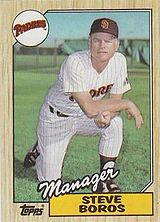
It was as a coach Boros would have his greatest impact. Though he was not known to be a speedy baserunner, this became the name of his game. He was considered the first person to use a stopwatch to time a pitcher's delivery to home plate and to time a catcher's throw to second base. As minor league manager in 1974, he led the Kansas City affiliate to 372 stolen bases with guys like UL Washington and current Texas Rangers manager Ron Washington. He joined the Royals coaching staff in 1975 and was instrumental in the development of base stealers Willie Wilson and Frank White. After joining the Montreal Expos staff in 1981, he was credited with helping Tim Raines become the force he was on the bases.
He got his first chance to be a MLB manager in 1983 with the Oakland Athletics, replacing Billy Martin. Martin was known to implement similar strategy regarding aggressive baserunning, but Boros was known to be more calm and relaxed. Obviously, that was not Martin's forte. Steve was let go in the middle of the 1984 season, replaced by Jackie Moore. He was named manager of the Padres in spring training of 1986, when Dick Williams, who led the Padres to the World Series in 1984 was let go after his latest clashes with his players. Boros only lasted one season in San Diego, as his biggest mistake was his overuse of Marvelle Wynne as his leadoff batter. Bill James criticised the move, saying Wynne was not a good leadoff hitter. Boros thought of Wynne along the same lines of Wilson, Raines and Rickey Henderson, but it did not work out.
Boros was a scout for the Los Angeles Dodgers in 1988 and studied the tendencies of his opponents. Some say he showed the Dodgers the tendency Oakland Athletics closer Dennis Eckersley had to thrown a back up slider to a left handed hitter on a 3-2 count. Of course, that was the pitch Kirk Gibson hit for the game winning homerun in game 1 of the 1988 World Series. He once again became a coach for the Royals in 1993 and 1994 and joined the Baltimore Orioles staff for the 1995 season.
In my opinion, Boros should have gotten more of a chance as a big league manager. The Athletics had little patience with their managers going back to the 1970s since Dick Williams left after winning the 1972 and 1973 World Series. The same impatience affected Boros in San Diego, as he only lasted his one season there. His general manager was Jack McKeon, who gave Larry Bowa a chance to manage before taking the job himself. With stints of a year and a half and a year, it is hard to judge Boros as a manager. He was a student of the game and deserved a full chance to be a MLB manager.

 RSS Feed
RSS Feed
